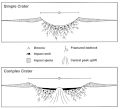Avak crater
This article relies largely or entirely on a single source. (June 2013) |
Avak is an impact crater centered approximately 12 km (7.5 mi) southeast of Barrow, Alaska, United States.[1]
Avak is a subcircular structure about 8 km (5.0 mi) in diameter and 1 km (0.62 mi) deep.[2] In the structure, metamorphic basement rocks and regionally flat lying sedimentary rocks are uplifted and intensely deformed. The Avak structure has no surface expression in the swampy, lake-dotted tundra of the Arctic coastal plain. The structure is covered by a thin veneer or permanently frozen Pliocene and Pleistocene rock. This means that the age of the impact took place anywhere between 95 million and 3 million years ago.[2]
History
The Avak structure was first recognized from seismic and gravity surveys in the National Petroleum Reserve No. 4 (NPR4) by the U.S. Navy during the period from 1943 to 1953. The Navy drilled the Avak 1 well in 1951, and encountered deformed rocks from near the surface to a total depth of 1,225 m (4,019 ft).[2] This led to the suggestion that Avak might be an impact structure.
The Avak structure provides the structural trap for the natural gas in the adjacent South Barrow and East Barrow gas fields. These fields have accumulated about 37 bcf of natural gas in Jurassic sandstones.[2]
In 1996, geologists from the U.S. Geological Survey found geologic evidence that indicated that the Avak structure was a meteorite impact structure.[2] The presence of planar deformation features (PDFs) was reported in 1995, so Avak is considered to a "confirmed" impact structure[3]
References
- ^ "Avak". Earth Impact Database. Planetary and Space Science Centre University of New Brunswick Fredericton. Retrieved 2009-08-19.
- ^ a b c d e C.E. Kirschner; Arthur Grantz; M.W. Mullen (May 1992). "Impact Origin of the Avak Structure, Arctic Alaska, and Genesis of the Barrow Gas Fields". American Association of Petroleum Geologists Bulletin. 76 (5): 651–679.
{{cite journal}}: Unknown parameter|last-author-amp=ignored (|name-list-style=suggested) (help) - ^ Therriault, A. M.; Grantz, A. (1995). "Planar Deformation Features in Quartz Grains from Mixed Breccia of the Avak Structure, Alaska". Abstracts of the Lunar and Planetary Science Conference. 26: 1043. Bibcode:1995LPI....26.1403T.
{{cite journal}}: Cite has empty unknown parameter:|month=(help); Unknown parameter|lastauthoramp=ignored (|name-list-style=suggested) (help)


